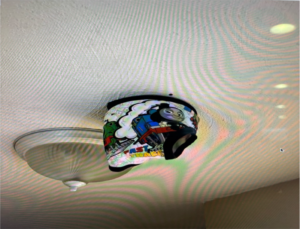An Act preventing fires and secondhand smoke in non-smoking rental housing.
Summary
Fire safety in rental housing is being critically undermined by smokers in no-smoking housing who take down their smoke alarms. This leaves all occupants of the building at risk of not just secondhand smoke from tobacco and cannabis but also fire from all causes. Landlords are presently almost entirely unable to enforce no-smoking rental agreements. The rules of evidence for smoking are applied too stringently. Landlords therefore file evictions for seemingly unrelated reasons.
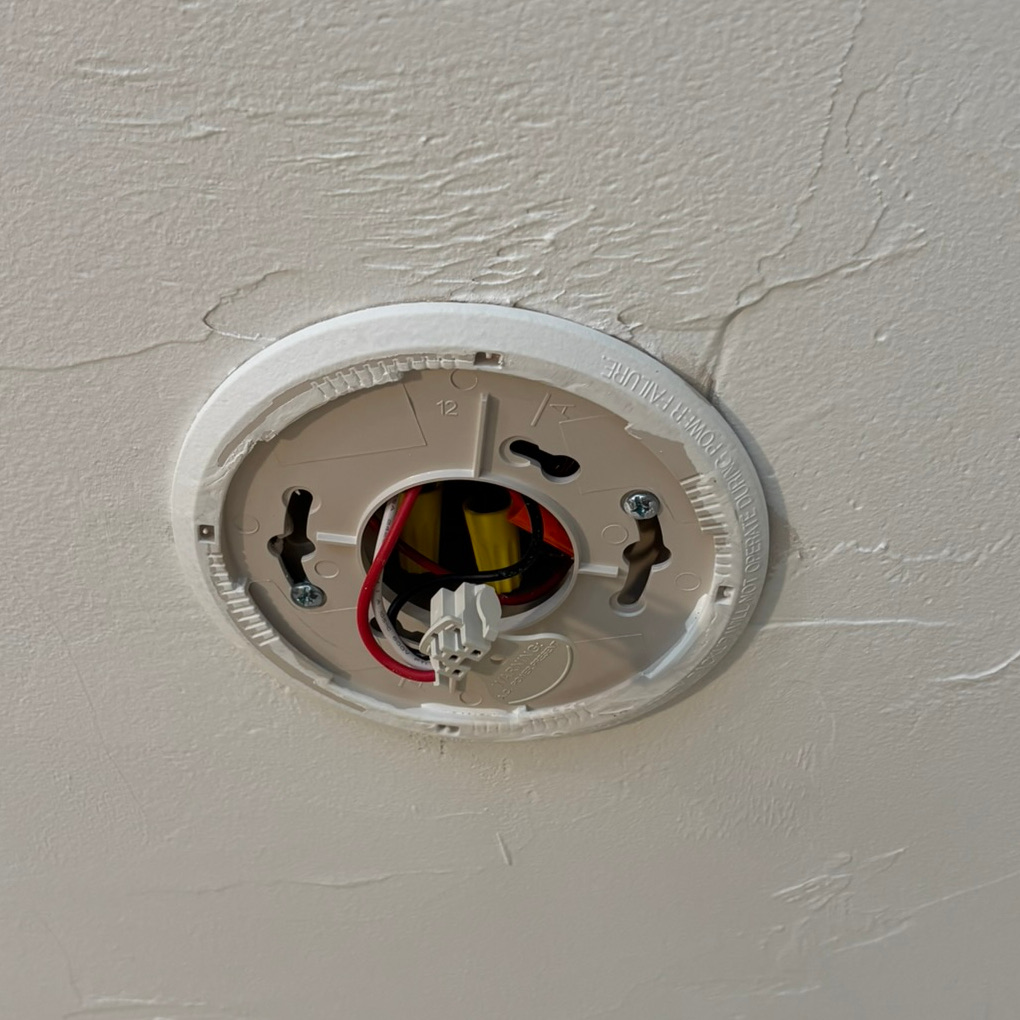
An all-too common sight in rental housing. This puts the lives of other renters at risk.
Update for January 2026
Our bill is in the Senate Joint Committee on the Judiciary S.1137, An Act preventing fires and secondhand smoke in non-smoking rental housing.
Fire Safety and Smoking Bill FAQ
Why is MassLandlords changing the eviction law?
We have never sought to increase evictions and we don't want to increase evictions now. We have worked very hard over the years to keep all renters stably housed, from our early advocacy on homelessness in the Senate special commission on housing (2015) through our litigation over rental assistance records and unfair RAFT denials (2021 - 2023).
This bill aims to create a strong incentive for renters to comply with housing safety rules. For renters who smoke, we want them to seek help to abandon smoking as a habit, to adopt alternative means of consumption or to smoke outside of rental housing. Above all, NO ONE SHOULD TAMPER WITH SMOKE ALARMS. Renters who do put everyone's lives at risk. Yet this is a recurring problem and there is no other enforcement mechanism outside of the eviction law.
This bill provides clear consequences for tampering with smoke alarms. We hope renters stop engaging in this risky behavior and remain stably housed. This bill does not require a single person to be evicted to meet its public health objectives.
Who would vote against this?
People are smoking in no-smoking housing because there are decreasing consequences for breaking no-smoking rental agreements. Those who would oppose this bill would probably tend to support smoking, breaking rental agreements in general or being disrespectful to neighbors. Good smokers leave their detectors on the ceiling, smoke out of a window or outside, or ideally find smoke-friendly housing. Smoking in non-smoking buildings is a public health threat to the majority of renters, who do not smoke.
How many smoking related fires are there each year?
According to the state fire statistics for 2023, there were 15,264 structure fires that year. Based on the percentage of time smoking was involved in a fatal fire (13%) we can estimate approximately 2,000 smoking-related structure fires each year.
How often is smoking related to fatal fire?
According to the state fire statistics for 2023, when the cause of a fire was known, smoking was to blame for one-in-four fatal fires.
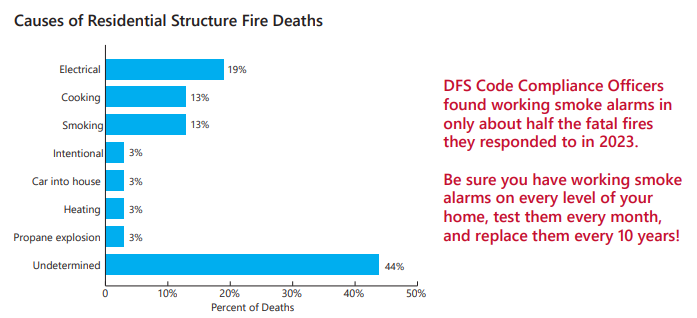
From the state website.
What does the state say renters should do about neighbors who smoke?
The state website on Smoke-free Housing says, "The most effective way to eliminate secondhand smoke in a multi-unit building is for your landlord to make the building completely smoke-free." That sadly is no longer true. Landlords simply cannot consistently enforce no-smoking provisions of rental agreements.
Can you give an example of where a smoking case failed?
Gwendolyn Property Management v. Goodwin, Johnson (2021, 21H85SP001694). A for-cause case was brought against smokers in a no-smoking building. Four witnesses testified. The judge threw out their testimony as hearsay. He said he didn't credit the witnesses' ability to differentiate between smoke and vape. Ha! A nonpayment eviction later got the renters out.
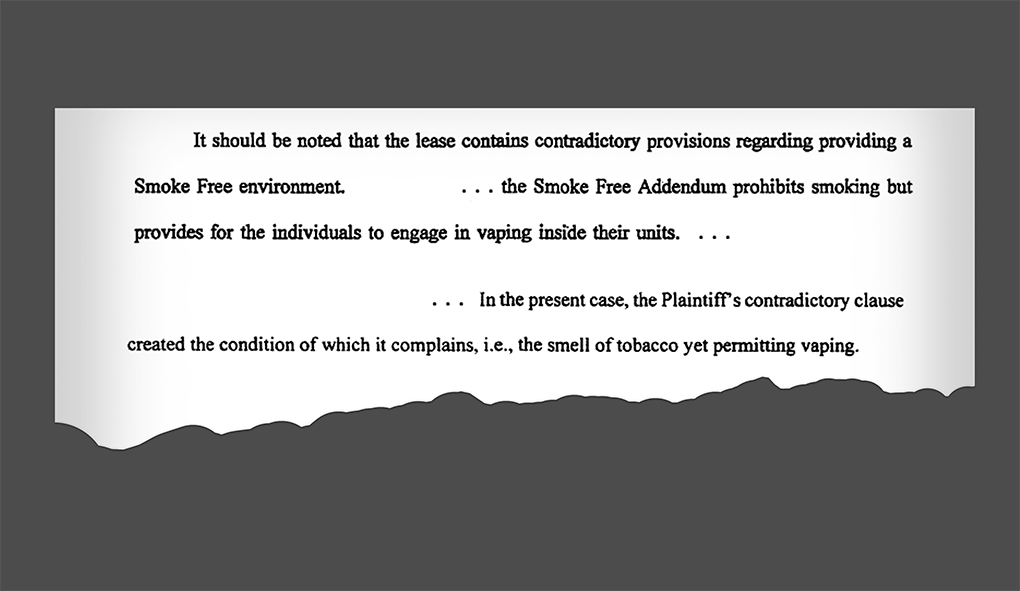
Actual text from an actual case where a no-smoking agreement was thrown out because the judge didn’t understand that combustion smoke and vapor are two different things, with different physical characteristics, and of which only combustion smoke would create an incentive to remove the smoke alarms.
Shouldn't we be using the term "smoke alarm" instead of "smoke detector"?
Yes, well, we want to prevent interference with both. Colloquially, a smoke alarm has a smoke detector built into it, so we felt "smoke detector" was more all-encompassing and would be clearer to the courts. To harmonize this text with National Fire Protection Association language and fire professionals, "smoke alarms and smoke detectors" both could be written into the final law.
A smoke alarm by NFPA definitions is a stand-alone unit like in the picture above. A smoke detector is used only in integrated systems with separately wired alarms.
Why do renters tamper with smoke alarms?
Smoke alarms detect smoke. Recreational smoking creates smoke thick enough to set off a smoke alarm. So renters remove, cover or unpower their detectors to smoke in peace.
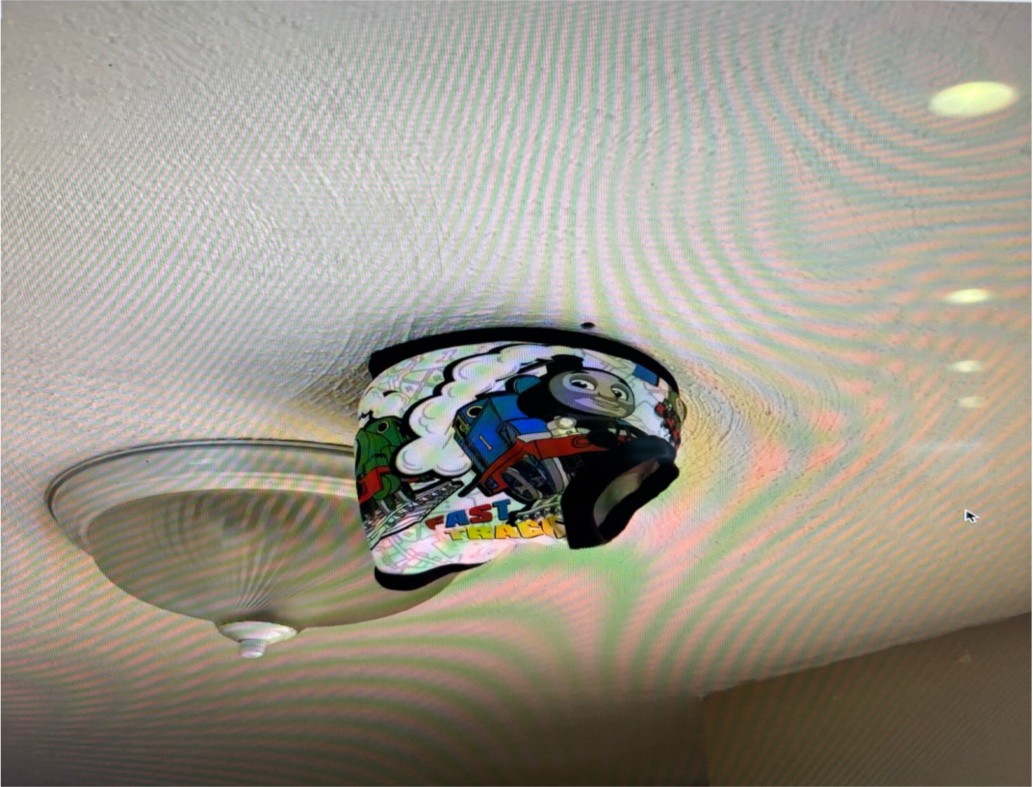
This real image from a Massachusetts apartment shows what one renter did to prevent smoke setting off their alarm. This would be hilarious if it weren't potentially deadly.
Is it tobacco, cannabis or both?
The problem is primarily cannabis. Cigarettes are highly processed and burn more completely than more home-grown cannabis, setting off alarms less frequently and creating less temptation to remove them. This reality aligns well with our bill text: smokers of tobacco are both less likely to set off smoke alarms and less likely to change their behaviors in response to a change in the laws. (We feel for and support all nicotine users in the struggle to cut back or quit.) The main issue here is recreational and therefore elective smoking, and the subsequent removal of smoke alarms.
Does this bill only matter for smoking-related fires?
No. Once smoke alarms have been taken down by a recreational smoker, any subsequent fire can turn deadly.
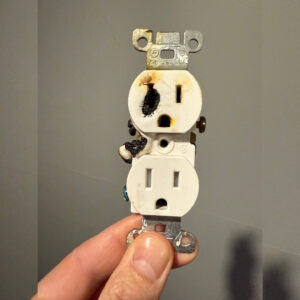
This real image from a Massachusetts apartment gives a reminder that the leading cause of fire is electrical. Here a recalled Instapot managed to avoid tripping an older generation breaker.
What if we do nothing?
Renters will continue to be harmed by secondhand smoke and put at risk of (or actually harmed by) fire.
Bill Numbers
In the senate, this is S1137.
Full Text and Explanation of the Smoking Bill
|
An Act preventing fires and secondhand smoke in non-smoking rental housing.
SECTION 1. |
This is a one-section bill. An alternative title could be “An act relative to fire safety enforcement in rental housing.” |
|
Chapter 239 of the General Laws is hereby amended by adding after Section 15 the following section:-
|
This bill modifies the eviction laws. |
|
In any case brought for cause where the complaint refers to smoking, it shall be a rebuttable presumption that there is smoking in a rented premises if any smoke detector has been removed, covered, or caused or suffered to be without batteries or power, or if a renter refuses an inspection of said detectors, provided that the inspection of the detectors is by a disinterested third party, the report is in writing, and the lessor proves the detectors were present and working prior to the inception of the tenancy.
|
Under Massachusetts law currently, an eviction can be brought for nonpayment, cause or “no cause stated.” Evictions for cause can be brought for smoking in a no-smoking apartment. Smoking is very hard to prove. Many, many cases have been dismissed for lack of what the courts call acceptable proof. This bill creates a legal assumption about whether there has been smoking in an apartment. It relies on the fact that there is no legitimate reason why a renter should take down, cover or otherwise unpower their smoke detectors. If a renter does this, they will be assumed to have been smoking. We do not accept the landlord’s statements in this regard. The landlord must prove the detectors were there when the renter moves in. A third party, like the fire department, must testify or provide a report that the detectors are not there now. A renter who refuses access to inspect the detectors is assumed to have removed the detectors. They can explain in court why they refused access if they have a good reason. |
|
If such presumption shall not be rebutted, the court shall find for the lessor to the extent the case has been brought for smoking in a rented premises where smoking is disallowed by written rental agreement;
|
If the rental agreement says there is no smoking, there were smoke detectors when the renter moved in, and there are no smoke detectors now, the landlord wins their case. A renter has to prove there was another reason the detectors were taken down in order to win. |
|
in any such case the court shall award attorneys’ fees and court costs to the prevailing party.
|
The landlord will be legally entitled to have their attorney costs and court costs reimbursed by the renter. |
|
The board of health, division of inspectional services, fire department, or the municipality in which the premises reside shall take requests for inspection of smoke detectors and shall attempt to perform such inspections within 3 business days, and may charge a fee to the lessor, provided the fee is published and not waived except for hardship of the lessor.
|
The town or city can charge a landlord to inspect an apartment for smoke detectors. They should try to inspect within three days of a request. A landlord who is very poor might be able to get their fee waived. |
|
Lessor proof of detectors may be provided by a statement of condition inventorying the quantity and locations of the detectors, photographs or printouts of images of the detectors installed with the renter’s signature, or a pre-occupancy inspection performed by a disinterested third party for any purpose, including an inspection prior to lease-up for subsidized housing.
|
A lessor has to prove the detectors were there with pictures or a third party report. A Section 8 inspection counts as a third party report. |
|
A case brought for cause shall not become a case for nonpayment solely on the basis of the complaint demanding court costs, attorneys’ fees, or other monetary damages deriving from the cause.
|
Sometimes judges tell us landlords we cannot file a for-cause eviction because we are asking for money back. We want it to be clear that a for-cause case can ask for money and remain for-cause. |
|
Nothing in this section shall be construed to limit the claims of renters not a party to the action harmed by the removal of smoke detectors in no-smoking housing.
|
If another renter in the building is harmed or killed by fire while the smoke detectors are not working, they can still sue the renter who took the detectors down, even if that renter has since been evicted. |

